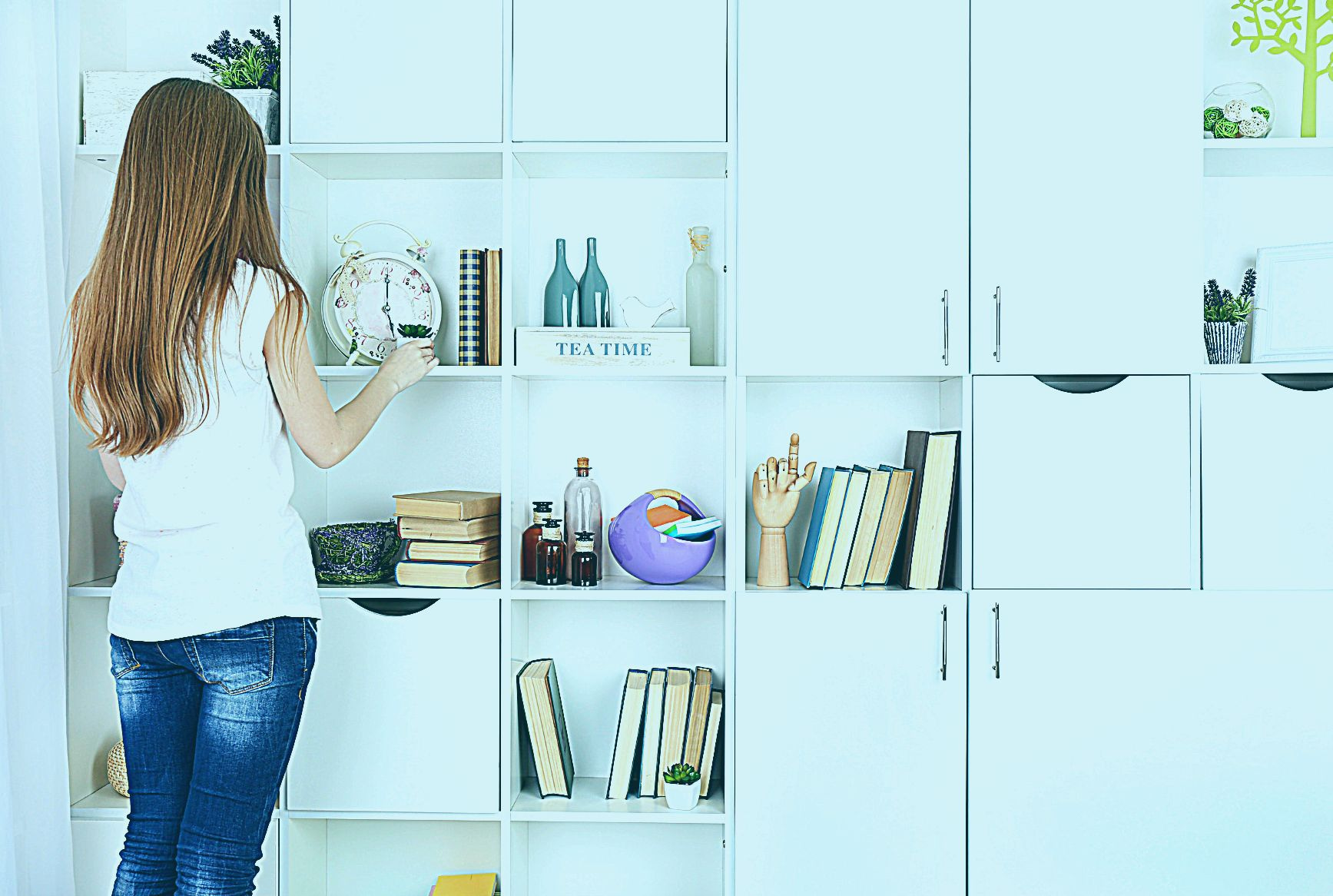
Today I’ll be addressing organization in terms of the physical stuff in our lives as well as in terms of the way we manage our time. And while this work does lead to boundaries work, I’m saving that conversation for another day.
However, if you suspect, or know, a lack of healthy boundaries is a contributing factor in your inability to get organized check out my Boundaries Quiz and get the Boundaries Quick Start Guide along with a boundary building plan focused on getting started where you’re at!
Additionally, in case it needs to be said, you don’t have to do anything you don’t want to. I firmly believe we all have a “set point” where we feel comfortable with a certain amount of stuff. Some of us are minimalists while some of us learn more toward the maximalist end of the spectrum.
However, I’m going to offer several reasons why you may want to organize your space and your life in general today, as well as offer a few tips and techniques to help you get started. So let’s dive in!
The link between organizing and clutter
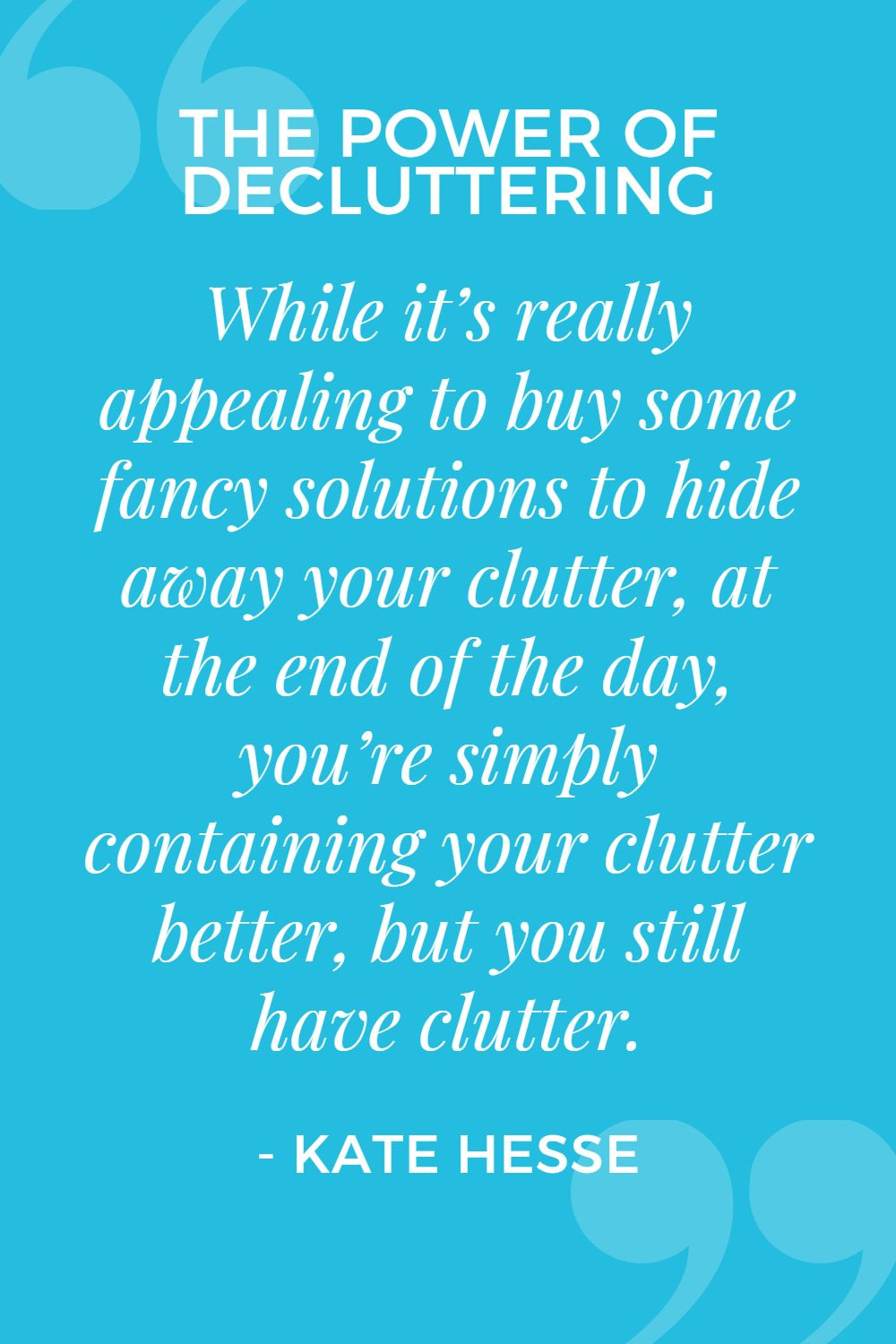 Today’s questioner asks about organizing – and while I’m going to offer some tips and techniques to help you organize your home and your life later in this episode, I’m also going to be talking a lot about decluttering.
Today’s questioner asks about organizing – and while I’m going to offer some tips and techniques to help you organize your home and your life later in this episode, I’m also going to be talking a lot about decluttering.
The Oxford Dictionary defines clutter as: “a collection of things lying about in an untidy mass”. If you didn’t have clutter, you wouldn’t have anything that needed to be organized.
And while it’s really appealing to buy some fancy baskets, boxes, and other storage solutions, to hide away your clutter. At the end of the day, you’re simply containing your clutter better, but you still have clutter. So when we get into the tips and techniques for getting organized, decluttering is going to feature prominently!
Visual clutter leads to mental clutter
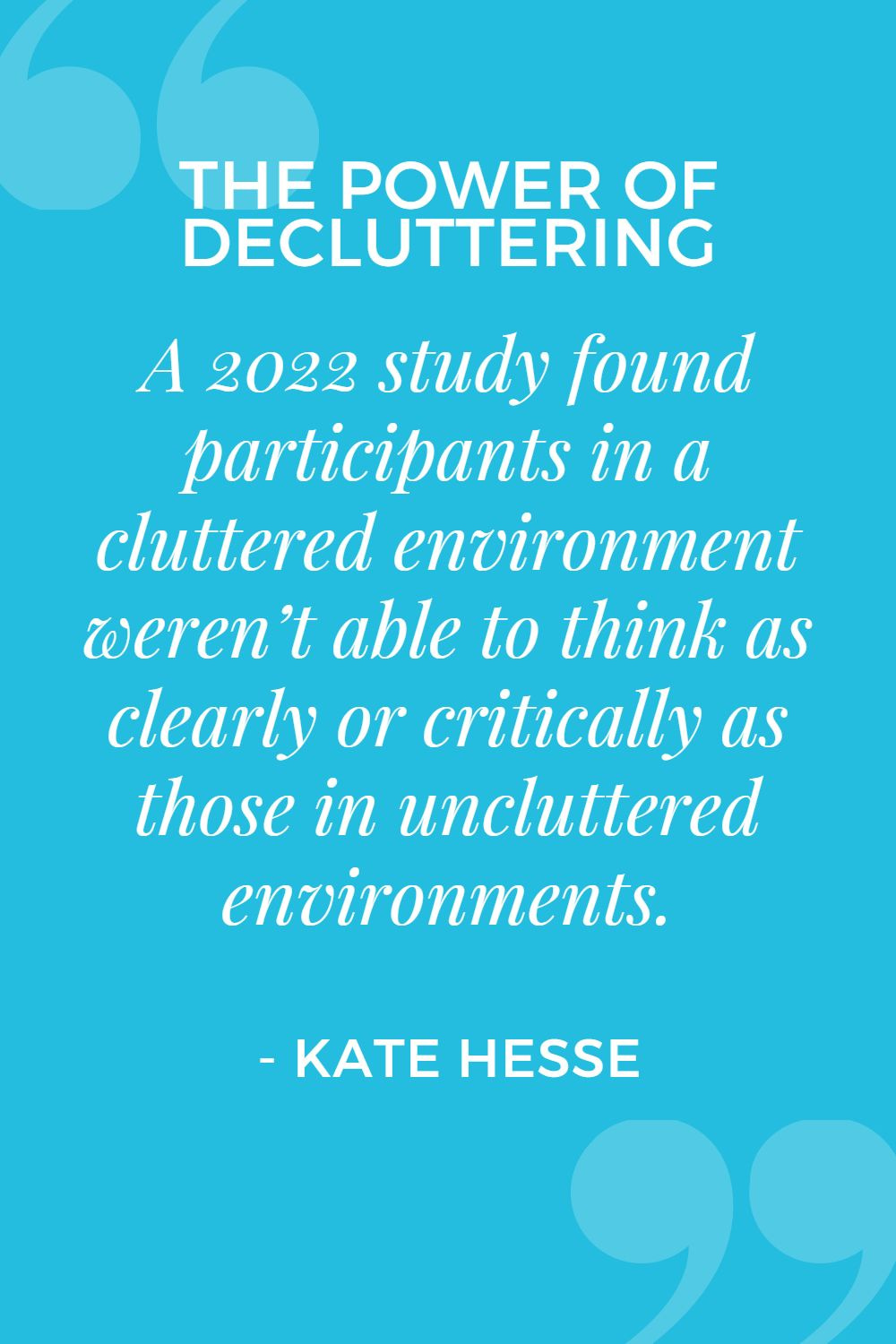 You might know this intuitively, but research has found, a cluttered home actually contributes to mental clutter and keeps you from being your efficient best.
You might know this intuitively, but research has found, a cluttered home actually contributes to mental clutter and keeps you from being your efficient best.
In a 2022 study published in Cyberpsychology, Behavior, and Social Networking researchers found “that participants in the high (vs. low) visual clutter condition reported lower cognitive capacity levels, and there was a significant correlation between cognitive capacity and message elaboration.”
Message elaboration is the extent to which people consciously think about a message.
In plain English – the researchers discovered that if you were in a visually cluttered environment – in this case trash or construction materials strewn about you – you weren’t able to think as clearly. Additionally, in cluttered conditions, you’re more likely to simply accept things without taking the time to consider if they actually make sense to you.
The physiological impact of clutter
You might have heard about this next study before – a 2009 UCLA study found a connection between cluttered homes and elevated cortisol levels. Cortisol is one of our stress hormones, and when it’s elevated, it’s a prime indicator you’re spending your time in the Sympathetic Nervous System state – or fight, flight, or freeze, and not in Parasympathetic Nervous System response – or rest and digest.
We’ve talked about your nervous system several times in previous episodes. As it applies to today’s question – clutter leads to increased cortisol levels which results in deprioritizing the “non-essential” functions in your body like your digestive and reproductive system, and causes the logic and reasoning centers of your brain to go offline.
So clutter actually makes it harder for you to think clearly and creatively as well as makes it harder for you to digest your lunch!
Stories behind your clutter
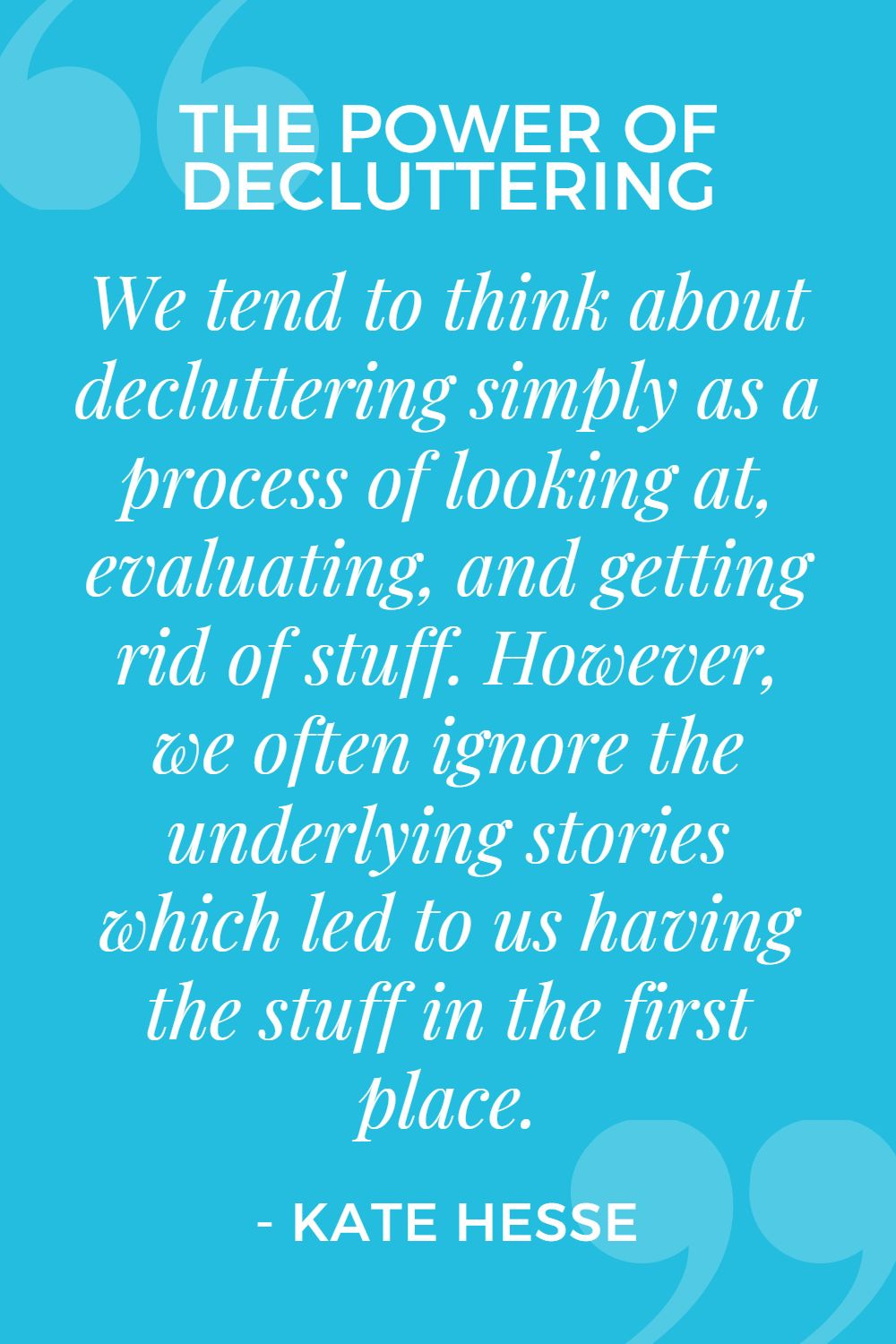 I think decluttering and organizing your home is often oversimplified. We tend to think about it simply as a process of looking at, evaluating, and getting rid of stuff. However, there are often underlying stories which led to us having the stuff in the first place.
I think decluttering and organizing your home is often oversimplified. We tend to think about it simply as a process of looking at, evaluating, and getting rid of stuff. However, there are often underlying stories which led to us having the stuff in the first place.
I’m on the maximalist end of the spectrum, which means my home can quickly go from comfy cozy to cluttered. Some things have always been easy for me to declutter, some have been much harder.
When I got serious about decluttering the entire house as part of my hygge process last year, I had to address the underlying stories which resulted in my decluttering struggles.
As I examined the categories I had trouble letting go of items in, I unearthed a host of stories and beliefs it was time for me to release. There were stories about lack and scarcity. And I had to recognize and release versions of myself which were not part of my reality.
Warehousing for an alternative version of yourself
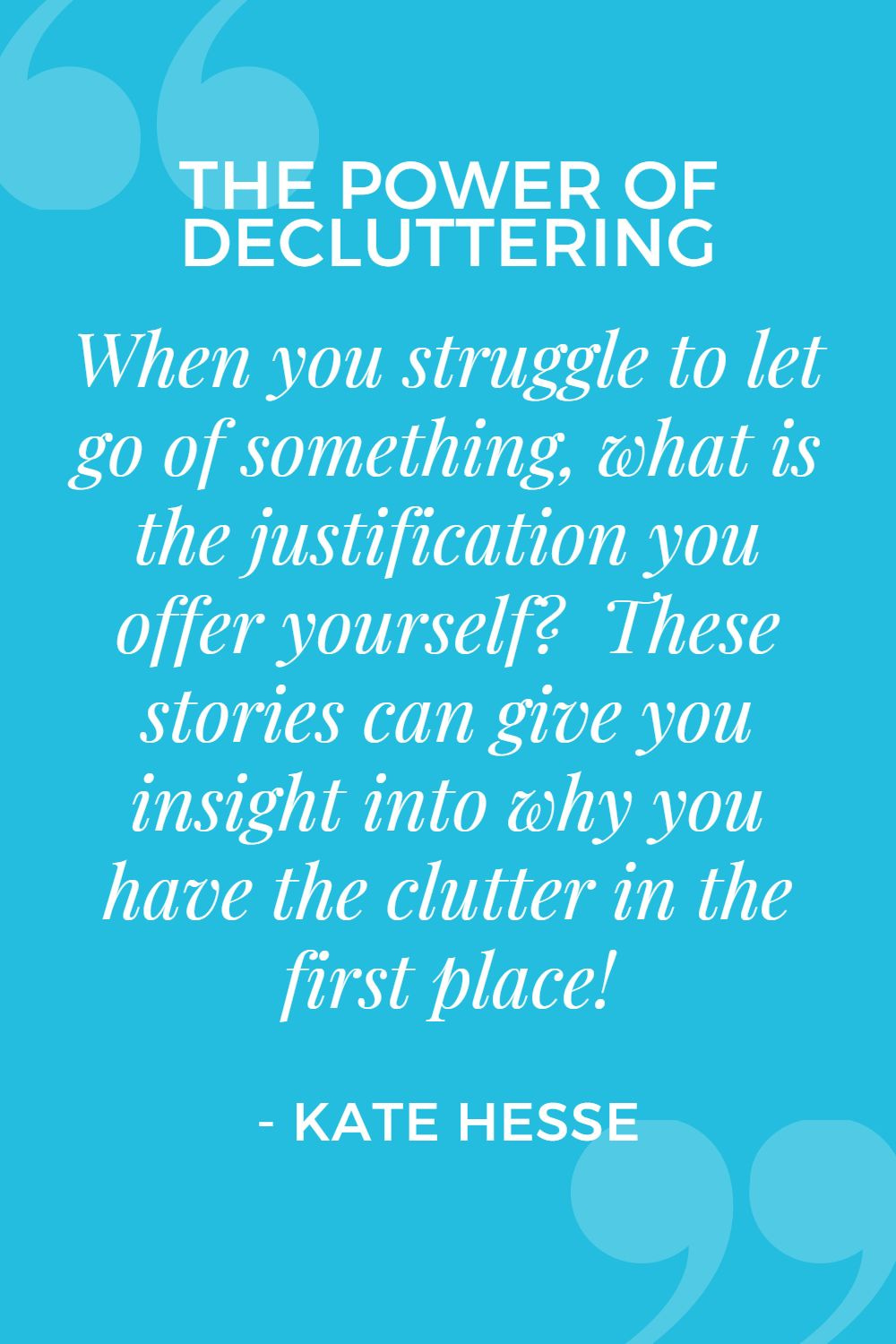 At one point I imagined I’d host dinner parties. I pictured myself getting dressed up and serving meals on beautiful china. But the truth is – I’m not a dinner party kind of person – I’m an introvert, and at this point in my life, I have the bandwidth to meal prep once a week, not cook elaborate dinners.
At one point I imagined I’d host dinner parties. I pictured myself getting dressed up and serving meals on beautiful china. But the truth is – I’m not a dinner party kind of person – I’m an introvert, and at this point in my life, I have the bandwidth to meal prep once a week, not cook elaborate dinners.
Releasing that version of myself allowed me to release the things that belonged to that reality, but not my daily lived life.
Take a moment and think about the stories behind your clutter.
When you struggle to let go of something, what’s the justification you offer yourself. Maybe they’re stories about scarcity, stories fueled by the sunk cost fallacy, or perhaps you’ve been storing things for an alternative version of yourself.
Whatever the stories are behind your clutter, take some time to consider if they’re really true, or if they’re based in fear. And then consider if you can release these stories.
If you’re not sure where to start, this is the kind of thing a coach can be incredibly helpful with – if you’re interested in learning more, schedule a Discovery Session with me today.
Double booking leads to unnecessary frustration and overwhelm
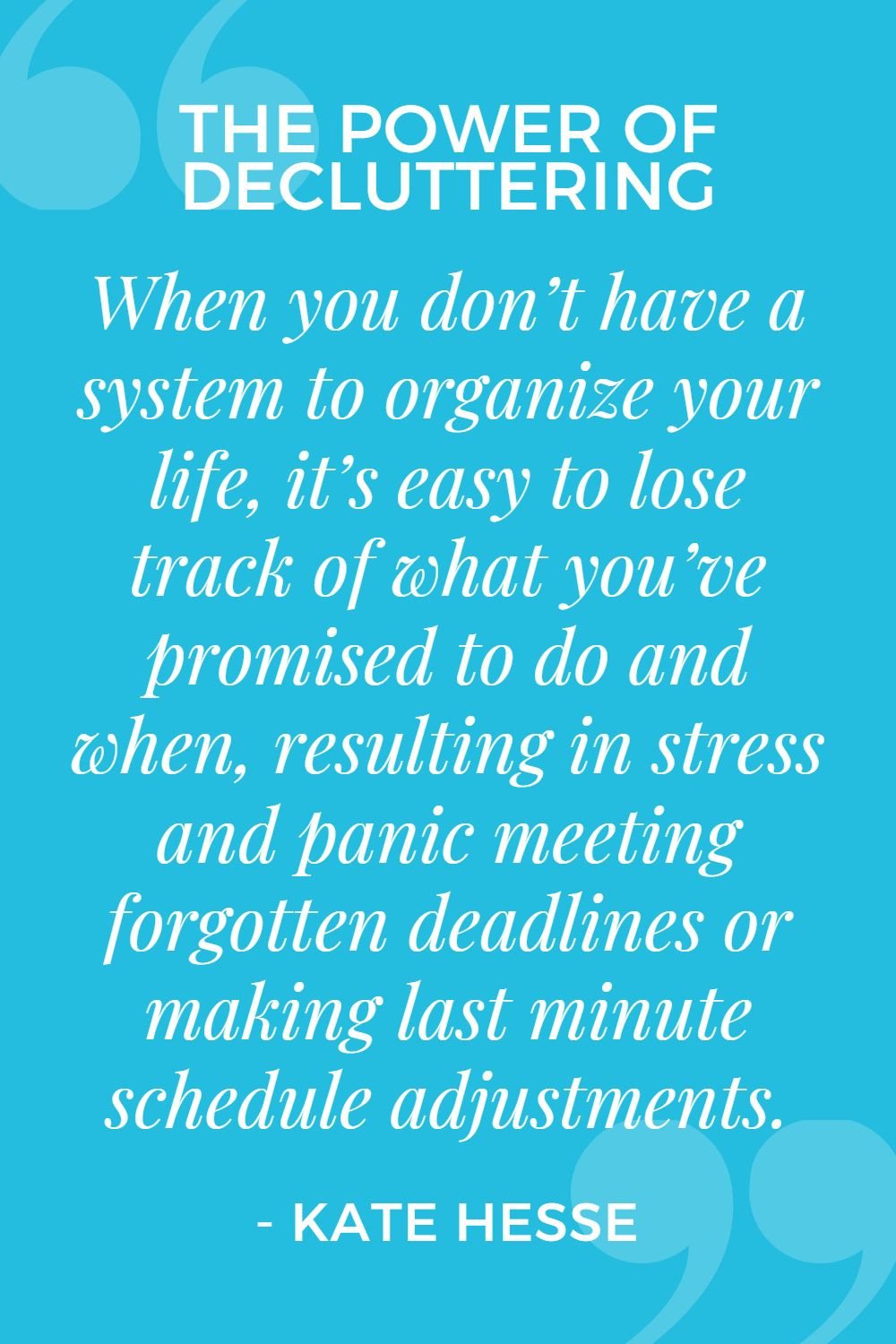 I once worked for someone who fairly regularly would double or triple book himself. He didn’t have a great system for organizing his calendar, and it wouldn’t be unusual for him to plan something over the phone, via email, and/or in-person only to realize he’d offered the same day and time slot to each appointment.
I once worked for someone who fairly regularly would double or triple book himself. He didn’t have a great system for organizing his calendar, and it wouldn’t be unusual for him to plan something over the phone, via email, and/or in-person only to realize he’d offered the same day and time slot to each appointment.
As you can imagine, each time this happened, it led to a last minute scramble.
First he had to determine which meeting was the highest priority. Then he had to cancel and reschedule the other ones.
And not only was this last minute prioritizing and rescheduling process incredibly stressful, but it also came with a lot of frustration directed at himself for repeating this mistake yet again.
When you don’t have a system to organize your life, it’s easy to lose track of what you’ve promised to do and when. And this results in stress and panic meeting forgotten deadlines or making last minute schedule adjustments. This can be not only incredibly frustrating and overwhelming, but if you’re a people pleaser can set off all sorts of self-critical stories.
We’ll dive into how to organize your life later in this episode. But before we get there, let’s talk about another way disorganization in your life can take up more of your time.
Getting organized means less time spent maintaining your world
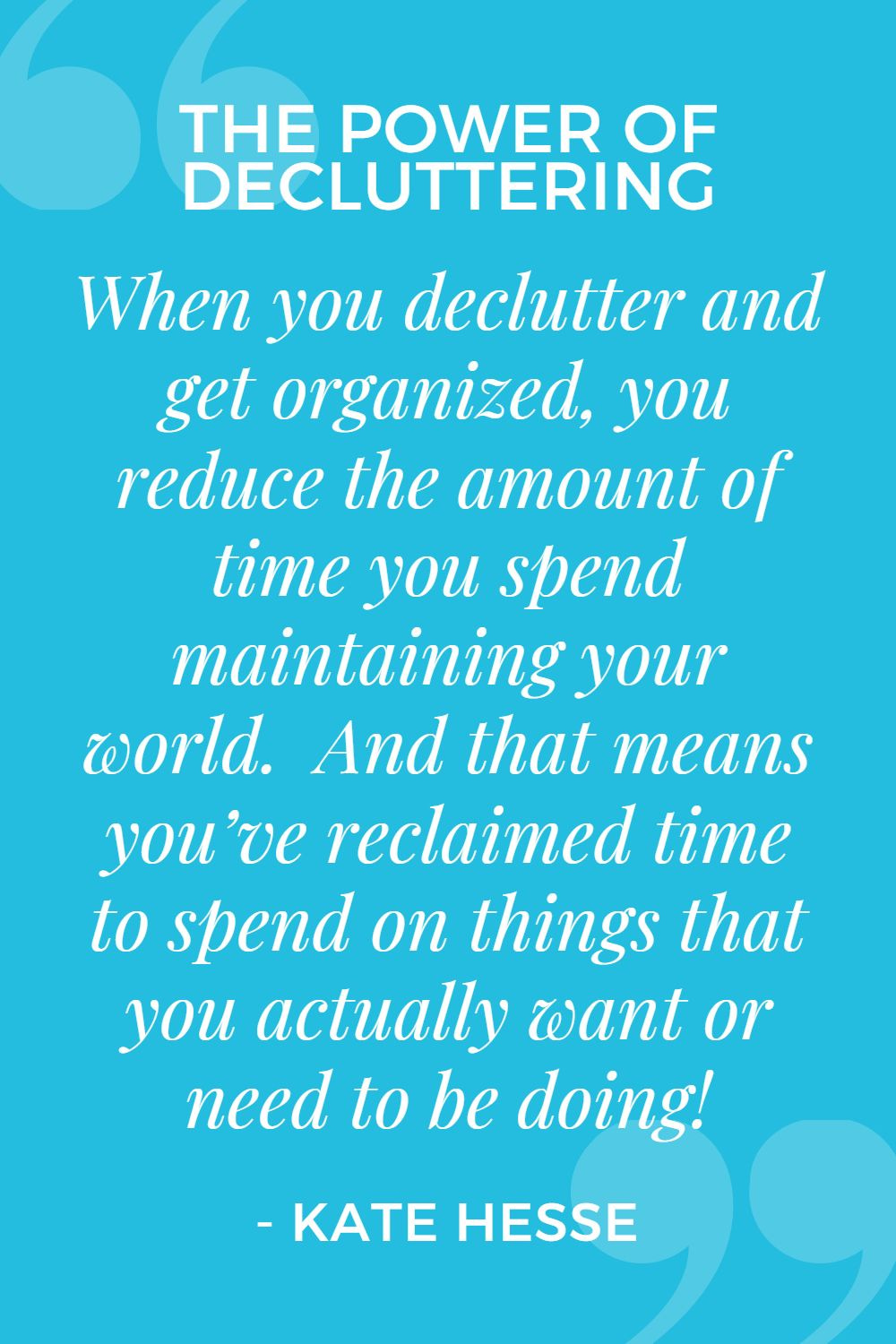 When you declutter and get organized, you reduce the amount of time you spend maintaining your world. And that means you’ve reclaimed time to spend on things you actually want or need to be doing!
When you declutter and get organized, you reduce the amount of time you spend maintaining your world. And that means you’ve reclaimed time to spend on things you actually want or need to be doing!
If you’re at home, look around the room you’re in right now. If you’re not, try this exercise when you get home.
Take a mental inventory of how long it will take you to clean the room – let’s be really basic – just picture dusting all the surfaces and vacuuming and/or moping the floor. Now imagine if you took 25-50% of the things out of the room – how long would it take to clean it now?
Again, I’m more of a maximalist, and I love to have my favorite things on display. I can promise, it’s a lot easier to dust an empty table than one with dozens of items on it. Keeping as many surfaces as I can clear means I spend less time cleaning. Which means I clean more thoroughly and because it feels easier, I actually clean more often. And this results in a faster and easier cleaning process as I’m not dealing with weeks of accumulation on every surface.
In the end, not only do I reclaim time, but I also live in a cleaner environment which is great for my health. Less dust means less allergens coating your surfaces and cleaner air.
Decluttering and getting organized means less time spent looking for things
I’m going to share a behind the scenes of a life in progress – the closet in my office is filled with all of my craft supplies. I’ve done a first pass on decluttering, but I’ve got a long way to go. Even though it’s relatively organized – things are stored on shelves, in cupboards, in bags, boxes, and bins, it’s one of those hide away the clutter types of organization.
I had put my sock knitting supplies away a few months ago, and decided recently I wanted to cast on a pair for summer knitting. I searched that closet for about 15 minutes before I finally found most of what I was looking for. Were it fully decluttered and organized, I would have easily been able to locate what I was looking for.
Instead I had to sort through stack of boxes and bins, a dozen bags, and then finally I found what I was looking for in one of the cupboards. If I didn’t have a dozen places to look, I could have quickly and easily found them. Less frustration and stress, more time spent actually doing what I wanted to do – knitting socks!
Get started decluttering with the lens technique
Hopefully by now you’re on board with me that decluttering is a key tool to getting organized. There are as many ways to declutter as there are people! But today I want to share one of my favorite techniques to get started decluttering.
I discovered this technique many years ago and it’s one I turn to every time a room feels like it’s getting a little out of control. The biggest benefit of this technique is it doesn’t require you to pull everything out and pile it up in the middle of the room – in my experience, that’s a great way to get overwhelmed and shove it all back where it came from.
To get started, pick a room you want to declutter. Remember those stories we talked about earlier – try to pick a room that isn’t filled with things that trigger your stories. For example – in my story about the dinner party version of myself holding onto fancy clothes and china, I might want to start with the guest bedroom instead of either the kitchen or my closet.
Why we don’t see what’s right in front of us
Once you’ve identified the room, take a photo of it – you’ll probably need to take a few photos to get it from every angle. Then put that photo on either a computer or tv screen to get it as big as possible. Look at the photo – you’ll probably start to notice all sorts of things you don’t see in your day-to-day life.
This is due to a psychological concept called habituation which simply stated is that after a while, we stop noticing things we see every day. (It also applies to your other senses too – you might stop hearing or smelling something if you experience it daily.)
When you take a photo you’re able to bypass your habituation to the objects in your home by dislocating them from the space you’re used to and onto a computer or tv screen.
Get started decluttering
Now the decluttering magic happens. Look at that photo – you’ll probably notice some things you can get rid of right away. There might be a pile of mail you can toss into the recycling bin, or a book you finished weeks ago and forgot to pass along to a friend. You might also notice things you just don’t enjoy living with but don’t actually notice during your daily life.
If you see something that looks like it doesn’t belong in the room, it’s a prime candidate for decluttering. You might work through the room section by section, or just jump to each piece that stands out to you. Once you’ve done your first pass, repeat the process, taking a new photo and noticing what stands out to you now that you’ve removed the first layer of clutter.
While this won’t help you thoroughly declutter your home, it’s a great place to start and helps you build your decluttering muscle and momentum to get ready to tackle the things hidden in drawers, in cabinets, and that might be more emotionally charged.
Don’t forget to download this week worksheet using the form below with everything you need to help you with organizing your life and decluttering your home!
Pick the organization tool that works for you
And as important as decluttering and organizing your home is, it’s also just as important to organize your life!
I know I say this almost every episode, but we’re not cookie cutter humans, so what works for one person might not work for you. Think about what’s worked – and not worked – for you in the past, and use that knowledge to help you get curious and experiment with techniques to create an organizational system that works for you!
Types of organizational tools
Some people love paper planners – you can buy systems already made, download printables, and/or create a system of your own. I love the Happy Planner – no affiliation, it just works for me – I can use their base planner and then print out supplemental pages I’ve designed to help me avoid writing the same thing over and over again. If you still write your to-do lists out by hand, you might find you resonate most with a paper planner.
Maybe you’re better served using an electronic calendar – you can have all of your appointments and tasks on your phone and/or computer. The nice part of using an electronic calendar is you can set up alerts and reminders on all of your electronic devices. If you tend to forget things, or don’t always remember to check your calendar each day, this might be the right solution for you.
Or, you might find a hybrid system works for you. This is what I use. My paper planner is the master list – if time needs to be reserved, or something needs to happen, it goes on my paper planner. However, I also add appointments and other tasks I’d like to be reminded about to my electronic calendar. Some of the benefits of this are the audible reminders of tasks as well as the ability to add addresses into appointment reminders so I can easily call them up for navigation assistance.
Getting organized requires a primary system
While I love the hybrid system, it’s important you prioritize one system as your “primary” system – the one EVERYTHING will go in. If you’re adding to both your paper and electronic calendar without a single go-to location you’ll be setting yourself up to quickly get into a double booked situation.
Whether you use a paper, electronic, or hybrid organizational system, the key is to pick one solution and use it consistently! It doesn’t do you any good to set up a planner only to use it for one week before abandoning it.
Are you ready to get organized?
Today we dove into the why behind organizing and decluttering your home and life. And I touched on a few tools and techniques to help get you started.
If you’re ready for actionable next steps and additional tips to bring more organization into your home and life in general, grab this week’s worksheet using the form below!
And if you’d like help in exploring your own stories and beliefs which are keeping you stuck in the decluttering process, I’d love to help – schedule a Discovery Session with me today and walk away with your first few action steps.
And remember – living your best life isn’t about changing your life – it’s about changing the way you show up for your life!
Show Notes
Additional Resources
Grab this week’s worksheet using the form below for everything you need to get started organizing and decluttering your home and your life!
Mentioned in this Episode
Take the Boundaries Quiz and get a boundary building plan tailored for where you’re at!
Learn more about your nervous system.
Schedule a Discovery Session.
Get on the VIP list to have all podcast worksheets delivered to your inbox each Tuesday morning.
Submit your question to be featured on a future episode.
Related
Leave a Reply Cancel reply
This site uses Akismet to reduce spam. Learn how your comment data is processed.